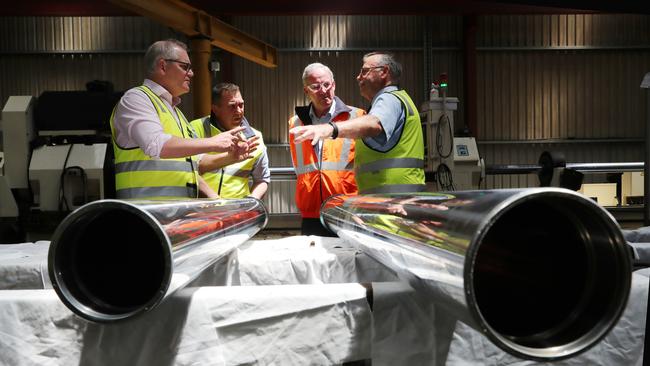Tasmanian company welcomes shift to nuclear powered submarines
A Tasmanian company has revealed how the decision to scrap the $90bn submarine deal with France will allow Australia to build its local capacity. FULL REPORT >>
Business
Don't miss out on the headlines from Business. Followed categories will be added to My News.
A TASMANIAN hydraulics manufacturer has welcomed the decision to scrap the $90bn submarine deal with France saying it will allow Australia to build its local capacity.
Prime Minister Scott Morrison announced on Thursday that Australia was entering a new security pact with the United States and the United Kingdom, and would be acquiring nuclear powered submarines.

John White is the managing director of Delta Hydraulics in Devonport and said they would be putting in bids for work when it goes to tender.
“The beauty of the build is being able to give Australia the capacity going forward and spending money here instead of overseas,” he said.
“We’ve shown our willingness to get involved in design, and the French were keeping it all in-house.”
Greens Senator Peter Wish-Wilson said the decision was “sabre-rattling” and “the unofficial start of Scott Morrison’s election campaign.”
“Short on detail but deeply concerning in its intent; building nuclear submarines in a new alliance with the US is a major provocation that ups the ante in a regional arms race and makes all Australians less safe,” he said.
Advanced Manufacturing and Defence Industries Minister Jeremy Rockliff said the Tasmanian government welcomed the federal government’s security partnership between Australia, the UK and the US.
“This will present significant opportunities for our Tasmanian advanced manufacturing and defence industries sectors.”
Delta Hydraulics previously acquired a $5m contract for design and manufacture work for the Collins class of submarine, as well a $1.2m contract for ongoing maintenance.
“Everything that is built in Australia adds to the economic activity and in terms of getting in-house home grown for the total equipment it will be very fragmented because there won’t be a single Australian company doing the design and manufacture,” Mr White said.
The nuclear powered submarines are expected to be built in South Australia and based in Western Australia.
“The potential for accidents is significant, as has been shown recently with hundreds of safety issues reported in Scotland, and the European Union found that further research was needed on the impact of radiation on oceanic ecosystems resulting from nuclear submarines,” Mr Wish-Wilson said.
Australian Maritime College Principal Michael van Balen said the college played a supportive role in developing Australia’s sovereign shipbuilding capabilities through its teaching and research programs, and would continue to align the programs to meet the needs of defence and industry partners.
“The new submarine proposal represents a significant advance in technology, and with this comes opportunities to expand our course content to produce skilled graduates ready for the workforce.”



